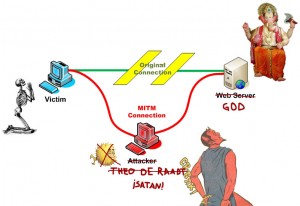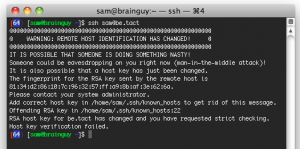Alright, so our friends Jerry DeWitt and Teresa MacBain of the The Clergy Project are continuing to bring important points and a lot of visibility to our happy movement. Most importantly, they’ve hit the big leagues: attention from the Westboro Baptist Church, the dank brain rendering plant in the otherwise friendly town of Topeka.
Yeah, I know other people might have different standards when they say big leagues, but for me it’s attention from Fred Phelps, the Evil Otto to Westboro’s game of Berzerk. I’m not saying that I fantasize about Fred Phelps or anything– wait, this is Fred Phelps we’re talking about here:
I completely fantasize about Fred Phelps. I keep a picture underneath my pillow for this purpose. For serious.
Okay, maybe that’ll do it.
But oddly enough, it’s not that post I want to talk about (other than: GodSmack? Really?!), but a related post from the “Eternal Life Blog“.
In it, the author throws something out there that I’d never seen before: a concept called “prayer disappointment.”
I personally believe the devil often uses prayer disappointment to instill doubt and unbelief, if possible, in Christians! There are various reasons why prayers are not answered and prayer can be a very complex subject to study. Backsliding does occur and has different faces. With Jerry DeWitt it was turning to atheism. [emphasis his]
Dan Corner of Evangelical Outreach. Fair Use, yo.
I’m baffled by this “prayer disappointment” thing. Is this Mr. Corner’s invention? I’ve seen people put the ineffectiveness of prayer on a lack of morality or an absence of faith. But to take responsibility for failure away from the sender and recipient, and give it to some malevolent third party seems to undermine God’s omnipresence.

The Remover of Obstacles is a much cooler god than anything Michelangelo has drawn up. So I used him instead.
In the computing world, this is called a “Man in the Middle Attack.” I’ve updated a standard illustration to depict “prayer disappointment.” The basic idea is that in a connection between two systems, an attacker can hijack the connection and intercept communications, often times posing as the intended recipient so that the victim is none the wiser. In Corner’s model, the victim is the person praying, the server is God, and the man in the middle is ¡SATAN!.
In the non-mythological world we have clear, workable solutions to this. That’s why we’ve all stopped using telnet and started using ssh fifteen or so years ago. Telnet is a way to get a command line on unix systems. It was great, but it was completely unencrypted and had no real authentication, so people could sniff out your password, see what you were doing, or, uhm, commit “shell disappointment.” SSH keeps track of the identities of systems you connect to cryptographically, and raises a big stink and doesn’t let you communicate if it senses something has gone wrong.
We use cryptography because we’re unsure of the lines of communication. We are limited in scope and awareness, which is something the monotheists insist that their god is not. Meanwhile, for Christians like Corner, prayer is the most important (and sometimes only) line of two-way communication between the god the supplicant. Corner even provides instructions for fact checking God as a form of authentication.
That’s useless. When I was seven, my Dad had a password that he would use on the intercom so I could buzz him into the apartment when I was alone. This is called a shared secret and is one of the more basic ideas in cryptography, and is what Corner’s fact checking comes closest to.
In fact it is neither shared, nor a secret. The fact that it’s not a secret is no surprise, the Christian bible is one of the more well known tomes on planet Earth. But without knowing which translation, it can’t even be said to be shared. Corner could tell us, but that would be unverified communication with a third party.
In the end, my Dad’s intercom password was far and away a better method for authenticating communication than bible searching. If prayer is the single real channel for communication between creator and creature, the best way we have to authenticate this infinitely important channel is a book that the Adversary knows better than the creature does.
If we continue to posit an omnipresent creator, there’s an alternative, 100% effective method for authenticating prayer. God could look at the connection, see El Diablo listening or trying to break in, and alert the supplicant via a separate channel. But for that to be effective, prayer would have to be distinct from kneeling and talking to yourself.
Meanwhile, everyone’s talking about Leah Libresco, the atheist blogger turned pre-Catholic blogger. She’s not a Catholic yet, she’s got a few bases to round before she gets there. Granted, the way they’re parading her around the pitcher may just walk her while the infield runs the warning track, but she has to touch all the bases.
Suffice it to say I just don’t see her stated problems with atheism as problems. We’re not really speaking the same language. Also suffice it to say that I don’t agree with her points, and I’m genuinely concerned about her choice of religion given her apparent stance on marriage equality. I sincerely think that if she wanted to join a religion (and I say “join a religion” versus “leave atheism” quite intentionally) there were much better choices available.
I also think she owes a lot of her notoriety to Jerry and Teresa. She gives news outlets the verisimilitude they’re looking for when they talk about providing “both sides of the story.”
But you know what? I didn’t want to talk about it, I just wanted to say that I FREAKING CALLED IT. Allow me to redirect you to one of my other blog posts, my open letter to the Catholic League:
I’ve also noticed a burgeoning market for ex-Atheists in the church circuit these days. I have to admit that it looks as honest as the ex-Satanists we saw in the eighties, but I’m sure the modern crowd considered themselves atheists in some way.
[…]
That might scare you, but imagine what would happen if the Catholic League manages to turn an atheist radio show host into a Catholic? At the very least, we’d clean up on the ex-Atheist circuit.
Me, in “Open Letter: I volunteer.”
I’m not saying that’s the reason that Leah converted. I am saying that’s why she’s getting the attention she is.
